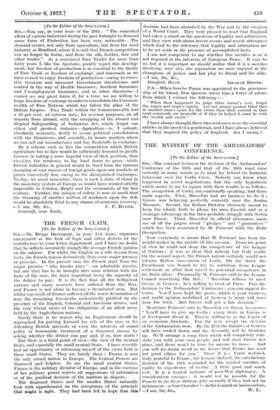[To the Editor of the SPECTATOR.] Sra,—You say, in your
issue of the 29th : " The concerted effort of various industries during the past fortnight to demand some form of Protection has been very noticeable. The demand comes, not only from agriculture, but from the wool industry at Bradford, where it is said that French competition can no longer be borne, and from the silk, leather, lace and other trades." As a convinced Free Trader for more than forty years I, like the Spectator, greatly regret this develop- ment, but freedom of production is as essential to the theory of Free Trade as freedom of exchange, and inasmuch as we have ceased to enjoy freedom of production—owing to exces- sive taxation and incessant Government interference and control in the way of Health Insurance, Accident Insurance and Unemployment Insurance, and in other directions—I cannot see any great harm if, for a time, we are willing to forgo freedom of exchange in order to consolidate the Common- wealth of Free Nations which has taken the place of the British Empire. Free Trade within the Commonwealth and a 10 per cent. ad valorem duty, for revenue purposes, on all imports from abroad, with the scrapping of the absurd and illogical Safeguarding of Industries Act, which forgot our oldest and greatest industry—Agriculture—is, I submit, absolutely necessary, firstly to secure political consolidation with the Dominions, and, secondly, to insure markets where we can sell our manufactures and buy foodstuffs in exchange.
By a scheme such as this the competition which British agriculture has to face would be sufficiently lessened to justify farmers in taking a more hopeful view of their position, thus checking the tendency to lay land down to grass—while British industries in general would be freed from the ruinous dumping of vast masses of foreign goods upon our markets at prices excessively low, owing to the disorganized exchanges. To-day, we must remember, there is such a state of chaos in the monetary system of Europe as would have seemed utterly impossible to Cobden, Bright and the economists of the last century. Further, the margin of safety is now so small that the throwing of another million of workmen upon the dole would be absolutely fatal to any chance of economic recovery.










































 Previous page
Previous page